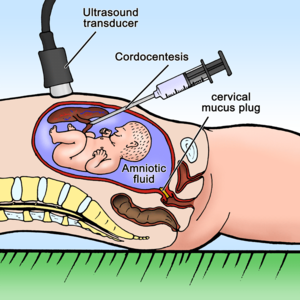Cordocentesis
| English: Cordocentesis Czech: Kordocentéza |
Cordocentesis (CC, also sometimes called Percutaneous Umbilical Cord Blood Sampling - PUBS) – is an invasive method utilized in prenatal diagnostics. This examination can be performed only starting from the 18th gestational week. The ultrasound guides a needle through the mother's abdomen and uterine wall into the fetal vein of the umbilical cord in order to retrieve a sample of fetal blood. The collected fetal lymphocytes can be then utilized for karyotype (turnaround time 48-72 hours) or molecular genetic analysis in order to exclude chromosomal aberrations or genetic diseases in the fetus. The fetal blood represents precious diagnostic material that can be used further for e.g. determination of blood group of the fetus, alloimunization or infection diagnosis. The risk of cordocentesis is, when performed by an experienced physician, comparable to that of amniocentesis (the risk of miscarriage is below 1%).


